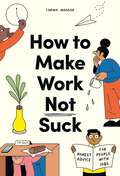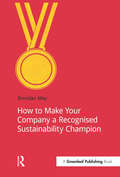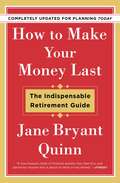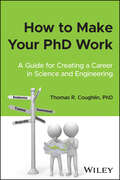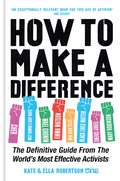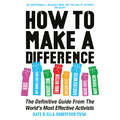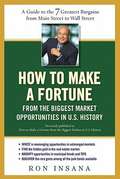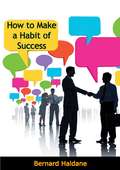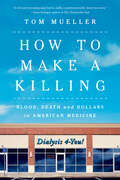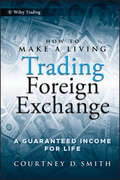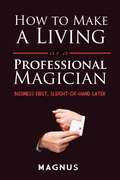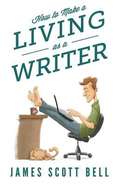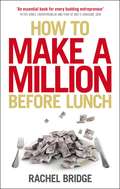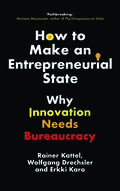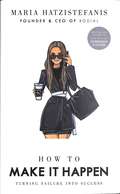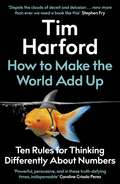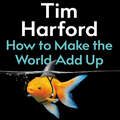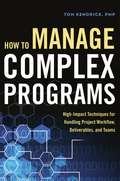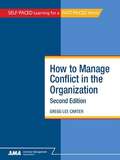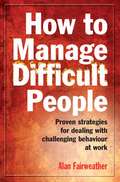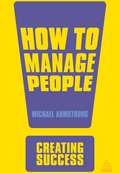- Table View
- List View
How to Make Work Not Suck: Honest Advice for People with Jobs
by Carina MaggarGoogle doesn't have the answer Dream big, plan smallWhen in doubt, HelveticaAssumption is the mother of all fuck upsStay curiousNo one knows what they're doing, neither should youIn this straight-talking guide to the real world of work, discover genuinely useful advice that will help you find the confidence to go for that promotion, quit your job, break into that industry, nail that pitch or climb over a creative brick wall. With 120 irreverent, unusual but always useful insights, this book will help you reach your career goals.
How to Make Your Cat an Internet Celebrity
by Patricia Carlin Dustin FenstermacherThe Internet offers an unprecedented opportunity for cats to become superstar "personalities" with revenue-generating multimedia brands--but only if you know how to cash in. With How to Make Your Cat an Internet Celebrity, readers can unlock the secrets of grooming your kitty for success, creating a terrific viral video, managing your cat's burgeoning stardom, and much more. Packed with practical tips and helpful diagrams, this indispensable resource shows how ordinary housecats can follow in the venerable pawprints of the Internet's brightest stars.
How to Make Your Company a Recognized Sustainability Champion
by Brendan MayIs it really worth the time and resources to make your company a recognized sustainability champion? And how on earth should you go about it? In this concise and practical book, Brendan May demonstrates why the companies that will be fit for purpose in 2020 are addressing sustainability now, and then outlines a strategy for how to do that.May draws on 15 years' experience on the front line of sustainable business – as Chief Executive of a business–NGO partnership, as an environmental campaigner and as advisor to multinational corporations on sustainability strategy and communications – and outlines the emerging trends that will change the rules of the game forever.By the time you've finished this book you'll know who you need to know, what you need to know, and the dos and don'ts in the quest to make your business a true champion of sustainability.
How to Make Your Money Last: The Indispensable Retirement Guide
by Jane Bryant QuinnNOW COMPLETELY UPDATED to reflect the changes in tax legislation, health insurance, and the new investment realities. In this &“highly valuable resource&” (Publishers Weekly, starred review) Quinn &“provides simple, straightforward&” (The New York Times) solutions to the universal retirement dilemma—how to make your limited savings last for life—covering mortgages, social security, income investing, annuities, and more! Will you run out of money in your older age? That&’s the biggest worry for people newly retired or planning to retire. Fortunately, you don&’t have to plan in the dark. Jane Bryant Quinn tells you how to squeeze a higher income from all your assets—including your social security account (get every dollar you&’re entitled to), a pension (discover whether a lump sum or a lifetime monthly income will pay you more), your home equity (sell, rent, or take a reverse mortgage?), savings (how to use them safely to raise your monthly income), retirement accounts (invest the money for growth in ways that let you sleep at night), and—critically—how much of your savings you can afford to spend every year without running out. There are easy ways to figure all this out. Who knew? Quinn also shows you how to evaluate your real risks. If you stick with super-safe investment choices, your money might not last and your lifestyle might erode. The same might be true if you rely on traditional income investments. Quinn rethinks the meaning of &“income investing,&” by combining reliable cash flow during the early years of your retirement with low-risk growth investments, to provide extra money for your later years. Odds are, you&’ll live longer than you might imagine, meaning that your savings will stretch for many more years than you might have planned for. With the help of this book, you can turn those retirement funds into a &“homemade&” paycheck that will last for life.
How to Make Your PhD Work: A Guide for Creating a Career in Science and Engineering
by Thomas R. CoughlinHow to Make Your PhD Work A modern guide for a challenging modern PhD market The job market for PhDs in science and engineering has become immensely more challenging in the last decade. As of 2022, less than 5% of PhDs attain permanent academic positions, yet books about navigating PhD programs continue to treat permanent academic employment as the assumed norm. Today’s PhDs need tools not only for completing their programs successfully, but for positioning themselves in a varied and competitive job market. How to Make Your PhD Work meets this need, with concrete, empowering advice that takes account of modern job market challenges and opportunities. It cuts through widespread misconceptions about STEM careers and funding, offers tips for navigating difficult degree programs, and supplies current or prospective PhDs with the tools to radically transform their post-degree career prospects. How to Make Your PhD Work readers will also find: Detailed discussion of topics including postdoctoral fellowships, nonacademic careers, success in industry, and more Twelve stories from PhD students who talk about their relationship with their advisor, their success with their project, and their transition into their careers Worksheets and case studies designed to help PhDs map out potential career paths An author with extensive experience of the nonacademic job market and a real understanding of the challenges STEM PhDs face How to Make Your PhD Work is ideal for any STEM PhD student, prospective student, or early career researcher looking to improve their positions in the job market.
How to Make a Difference: The Definitive Guide from the World's Most Effective Activists
by Kate Robertson Ella Robertson"An exceptionally relevant book for this age of activism." Bob GeldofWith a foreword by Kofi Annan, former Secretary-General of the UN (1997-2006).How to Make a Difference is a practical roadmap to modern day activism created by the powerful and imaginative minds behind the world's biggest campaigns including Colin Kaepernick, Emma Watson, Sir Bob Geldof, Fatima Bhutto, Black Lives Matter, Doutzen Kroes, Yeonmi Park, Terry Crews, Cher, Matt Damon, Paul Polman and Gina Miller; collectively they combine the latest models of thinking, their real life experiences, radical techniques and effective advice in order to help incentivize everyone and anyone who has ever wondered, how can I help? From How to Change the Law, How to Protest, How to Use Social Media Effectively, How to End a Problem Forever and How to Change a Big Organization, this book educates as much as it encourages and informs us all to see the world as something that can and must be changed. This book will help you find an active role in positive, necessary activism and meaningful change on every scale across the globe. The only book to pool together the biggest names in activism and showcase how they have used their voices, their networks and their abilities to change the world around us.How to Make a Difference speaks to a generation who are switching selfie-sticks for protest placards and will showcase how everyone has the ability to be the change they want to see in the world.If not now, when? If not you, who?Perfect for fans of This Is Not a Drill, No One Is Too Small to Make a Difference and There Is No Planet B.
How to Make a Difference: The Definitive Guide from the World's Most Effective Activists
by Kate Robertson Ella Robertson"An exceptionally relevant book for this age of activism." Bob GeldofWith a foreword by Kofi Annan, former Secretary-General of the UN (1997-2006).How to Make a Difference is a practical roadmap to modern day activism created by the powerful and imaginative minds behind the world's biggest campaigns including Colin Kaepernick, Emma Watson, Sir Bob Geldof, Fatima Bhutto, Black Lives Matter, Doutzen Kroes, Yeonmi Park, Terry Crews, Cher, Matt Damon, Paul Polman and Gina Miller; collectively they combine the latest models of thinking, their real life experiences, radical techniques and effective advice in order to help incentivize everyone and anyone who has ever wondered, how can I help? From How to Change the Law, How to Protest, How to Use Social Media Effectively, How to End a Problem Forever and How to Change a Big Organization, this book educates as much as it encourages and informs us all to see the world as something that can and must be changed. This book will help you find an active role in positive, necessary activism and meaningful change on every scale across the globe. The only book to pool together the biggest names in activism and showcase how they have used their voices, their networks and their abilities to change the world around us.How to Make a Difference speaks to a generation who are switching selfie-sticks for protest placards and will showcase how everyone has the ability to be the change they want to see in the world.If not now, when? If not you, who?Perfect for fans of This Is Not a Drill, No One Is Too Small to Make a Difference and There Is No Planet B.(p) 2019 Octopus Publishing Group
How to Make a Fortune from the Biggest Market Opportunitiesin U.S.History
by Ron InsanaA CNBC senior analyst reveals what you need to know to take advantage of today's economy to rebound and rebuild lost nest eggs and fortunes. For those in the know, today's financial headlines don't spell disaster. They spell the sale of a century. But it takes a trustworthy veteran of the trading trenches to guide investors through these volatile times. Drawing on his two decades as a financial reporter, plus three recent years working on Wall Street, Ron Insana helps readers restore their depleted portfolios by showing them: ? How to determine reemerging opportunities in submerged markets ? Where to invest in really legit real estate ? How to magnify the magnificent opportunities in municipal bonds and Treasury Inflation Protected Securities (TIPS) ? Where to go mining for the rare gems among the heaps of junk bonds The paperback edition is completely revised and updated with timely advice for a recovering economy. For anyone sifting through retirement- account wreckage or a tanking net worth, How to Make a Fortune from the Biggest Market Opportunities in U.S. History is the ultimate rescue manual for reaping rich rewards.
How to Make a Habit of Success
by Bernard HaldaneAN ELECTRIFYING NEW TECHNIQUE THAT SHOWS YOU HOW TO BUILD ON YOUR ACHIEVEMENTS SO THAT SUCCESS BECOMES A CONTINUING PATTERN…A HABIT!Within the pages of this remarkable book are the clear, simple techniques that can help you make your life richer and more rewarding. There are scores of simple, easy-to-follow suggestions and methods that can help you turn seeming failure into success.As you read through these pages you’ll be surprised to see how easy it is to make success a continuing repetitive action...a habit. Here you’ll discover the secrets that can open your life to success...techniques that have been commended by Presidents Kennedy and Johnson and by scores of leading educators, industrialists, and others.In the quarter of a century that Bernard Haldane has devoted to studying what makes people work and how they become successful, he has interviewed and helped more than 40,000 management and professional people. He served as consultant to the placement department of the Harvard Business School and lectured to graduate classes at Fairleigh-Dickinson University. He was chairman of the board of trustees of the Foundation for Re-employment, Inc.
How to Make a Killing: Blood, Death And Dollars In American Medicine
by Tom Mueller“Inspiring and deeply distressing.” —Ezekiel J. Emanuel, author of Which Country Has the World’s Best Health Care? How did a lifesaving medical breakthrough become a for-profit enterprise that threatens many of the people it’s meant to save? Six decades ago, visionary doctors achieved the impossible: the humble kidney, acknowledged since ancient times to be as essential to life as the heart, became the first human organ to be successfully replaced with a machine. Yet huge dialysis corporations, ambitious doctor-entrepreneurs and Beltway lobbyists soon turned this medical miracle into an early experiment in for-profit medicine—and one of the nation’s worst healthcare catastrophes. With powerful insight and on-the-ground reporting, New York Times best-selling author Tom Mueller introduces an unforgettable cast of characters. Heroic patients, including a Hollywood stuntman and body double, risk their lives to blow the whistle on how they’ve been mistreated. An unpaid activist living in a south Georgia trailer park fights to save patients from involuntary discharge from their lifesaving care. Industry insiders put their careers on the line to speak out about the endemic wrongs and pervasive inequality they’ve witnessed—and about dialysis executives who dress as musketeers and Star Wars characters to exhort their employees to more aggressive profit-seeking. Mueller evokes the scientific ingenuity and optimism of the 1950s and 1960s, when the burgeoning field of organ transplant and early dialysis machines offered long-awaited hope for lifesaving care. That is, until a New York salesman had himself dialyzed on the floor of the House, and Congress made renal disease the only “Medicare for All” condition—opening the financial floodgates for Big Dialysis. Of the thousands caught in a web of corporate greed, a disproportionate number are Black and Latino, highlighting the stark racial divides already endemic to American medicine. How to Make a Killing reveals dialysis as a microcosm of American medicine and poses a vital challenge: find a way to fix dialysis, and we’ll have a fighting chance of fixing our country’s dysfunctional healthcare system as a whole, restoring patients, not profits, as its true purpose.
How to Make a Living Trading Foreign Exchange
by Courtney SmithSolid Forex strategies for capturing profits in today's volatile marketsHow to Make a Living Trading Foreign Exchange puts the world of Forex at your fingertips. Author Courtney Smith begins with an introduction to the Forex market-what it is and how it works. He then delves into six moneymaking techniques for trading Forex, including his unique Rejection Rule that doubles the profit of basic channel breakout systems. In addition to two specific methods for exiting positions at critical levels, Smith also discusses powerful risk management techniques and successful trading psychology strategies that will keep you one step ahead of the game.Reveals the secrets of the Forex market and how to create a lifetime of income trading itOffers advice on maximizing profits during the volatile swings that have increasingly become the normOther titles by Smith: Option Strategies, Third Edition, Seasonal Charts For Futures Traders, Commodity Spreads, and Profits Through Seasonal TradingMake more from today's Forex market with How to Make a Living Trading Foreign Exchange.
How to Make a Living as a Professional Magician: Business First, Sleight-of-Hand Later
by Matt PattersonYou may be able to pull off an impressive card trick, but can you recruit new clients and tailor your show to different occasions? In the only guide of its kind, professional magician Magnus shows you the ins and outs of managing your career in magic. His tried-and-true methods will convert you — presto, change-o — into a successful professional.Magnus will help you with developing the persistence and conviction you'll need for a career in close-up magic, making your pitch to potential employers, and promoting and marketing your act. He'll advise you on the tricks that will provide you with the most mileage — the time-tested audience-pleasers that can be performed in a wide variety of situations — and the best ways to practice them to ensure a smooth execution. His advice on cultivating skills that contribute to a successful performance, getting along with coworkers, and handling hecklers will save you untold aggravation and smooth the path toward a magical career.
How to Make a Living as a Writer
by James Scott BellIt's the best time on Earth to be a writer. More writers are making money today than at any other time in history. For centuries few have been able to support themselves from the quill or the keyboard alone. Not anymore. With the rise of ebooks and indie publishing there are now more opportunities than ever for writers to generate substantial income from their work. And there is still a traditional publishing industry that needs new talent to keep growing. In How to Make a Living as a Writer, you'll learn the secrets of writing for profit and increasing your chances of making a living wage from your work. Here are some of the subjects covered: - The 7 Secrets of Writing Success - The 8 Essentials of Your Writing Business - How to Reach Your Goals - Keys to a Winning System - How to Stay Relentless - Unlocking Your Creativity - How to Write More, Faster - Comparing Traditional and Self-Publishing - How to Go Traditional - How to Go Indie - How to Form Multiple Streams of Writing Income - How to Write a Novel in a Month - How to Choose Non-Fiction Subjects - How to Keep a Positive Mental Attitude - Resources for Further Study And much more, all to help you write what you love and earn what you’re worth. James Scott Bell has made a living as a writer for nearly two decades, and shares with you everything he knows about the best practices for turning your writing dream into a reality.
How to Make a Million Before Lunch
by Rachel BridgeFed up with working for someone else? Want to start your own business but don't want to wait years to reap the rewards? Take every shortcut you can ... and get there fast.As Enterprise Editor of The Sunday Times, Rachel Bridge has met hundreds of the world's most successful entrepreneurs. Now she shares their expertise to show you the top 20 shortcuts to creating a booming business - and the energy-sapping, time-wasting traps to avoid along the way - so you too can make a million - asap.
How to Make an Entrepreneurial State: Why Innovation Needs Bureaucracy
by Rainer Kattel Wolfgang Drechsler Erkki KaroA ground-breaking account which shows how the public sector must adapt, but also persevere, in order to advance technology and innovation From self-driving cars to smart grids, governments are experimenting with new technologies to significantly change the way we live. Innovation has become vitally important to states across the world. Rainer Kattel, Wolfgang Drechsler and Erkki Karo explore how public bodies pursue innovation, looking at how new policies are designed and implemented. Spanning Europe, the USA and Asia, the authors show how different institutions finance new technologies and share cutting-edge information. They argue for the importance of &‘agile stability&’, demonstrating that in order to successfully innovate, state organizations have to move nimbly like start-ups and yet ensure stability at the same time. And that, particularly in the light of the Covid-19 pandemic, governments need both long-term policy and dynamic capabilities to handle crises. This vital account explores the complex and often contradictory positions of innovating public bodies—and shows how they can overcome financial and political resistance to change for the good of us all.
How to Make it Happen: Turning Failure into Success
by Maria HatzistefanisSuccess is not final and failure is not fatal. Having spent 20 years building her own company (described by the press as "an overnight success"), Maria Hatzistefanis acknowledges how hard it is to keep going and find your motivation, especially in the face of self-doubt, rejection and unexpected setbacks. This book spells out how to motivate yourself and harness your drive and energy to make things happen. With clear guidance, tips and celebrity stories throughout, Maria sums up her business secrets with three golden rules: set your goals; plot your trajectory; make it happen! This book will help anyone looking to grow their business and enable readers everywhere to find their own "Make It Happen" mindset. Everyone can learn from this book, no matter where you are in your career.
How to Make it Happen: Turning Failure into Success
by Maria HatzistefanisSuccess is not final and failure is not fatal.Maria Hatzistefanis should know. Having spent 20 years building her own company (described by the press as 'an overnight success'), she acknowledges how hard it is to keep going and find your motivation, especially in the face of self-doubt, rejection and unexpected setbacks.This punchy, easy to digest book spells out how to motivate yourself and harness your drive and energy to make things happen. With clear guidance, tips and celebrity stories throughout, Maria sums up her business secrets with three golden rules: set your goals; plot your trajectory; make it happen! This book will help anyone looking to grow their business and enable readers everywhere to find their own 'Make It Happen' mindset. Everyone can learn from this book, no matter where you are in your career.
How to Make the Barriers Fall: Heathrow Tunnel and Restaurants Without Food--Opening Your Mind to Intersectional Ideas
by Frans JohanssonBreaking down our associative barriers is the first challenge we face in our search for the intersection of fields, disciplines, or cultures where extraordinary new ideas emerge. This chapter shows you how to do it.
How to Make the World Add Up: Ten Rules for Thinking Differently About Numbers
by Tim HarfordThe Sunday Times Top Ten bestseller'Tim Harford could well be Britain's Malcolm Gladwell'Alex Bellos, author of Alex's Adventures in Numberland'If you aren't in love with stats before reading this book, you will be by the time you're done. Powerful, persuasive, and in these truth-defying times, indispensable'Caroline Criado Perez, author of Invisible Women In How to Make the World Add Up, Tim Harford draws on his experience as both an economist and presenter of the BBC's radio show 'More or Less' to take us deep into the world of disinformation and obfuscation, bad research and misplaced motivation to find those priceless jewels of data and analysis that make communicating with numbers so rewarding. Through vivid storytelling he reveals how we can evaluate the claims that surround us with confidence, curiosity and a healthy level of scepticism. It is a must-read for anyone who cares about understanding the world around them.'Tim Harford is our most likeable champion of reason and rigour . . . clear, clever and always highly readable'The Times, Books of the Year'Fascinating and enjoyable'Bill Bryson'Now more than ever we need a book like this'Stephen Fry'Wise, humane and, above all, illuminating. Nobody is better on statistics and numbers - and how to make sense of them'Matthew Syed'One of the most wonderful collections of stories that I have read in a long time . . . fascinating.'Steven Levitt, co-author of Freakonomics'Wise and useful . . . such a delight' Financial Times'What should we do when someone makes a claim that they say is based on data? This wise book, distilled from years of experience, gives us the ten commandments, from first examining our feelings, to finally having the humility to admit we may be wrong. Priceless'Professor Sir David Spiegelhalter
How to Make the World Add Up: Ten Rules for Thinking Differently About Numbers
by Tim HarfordThe Sunday Times Bestseller'Tim Harford is one of my favourite writers in the world. His storytelling is gripping but never overdone, his intellectual honesty is rare and inspiring, and his ability to make complex things simple - but not simplistic - is exceptional. How to Make the World Add Up is another one of his gems. If you're looking for an addictive pageturner that will make you smarter, this is your book' Rutger Bregman, author of Humankind'Tim Harford could well be Britain's Malcolm Gladwell'Alex Bellos, author of Alex's Adventures in Numberland'If you aren't in love with stats before reading this book, you will be by the time you're done. Powerful, persuasive, and in these truth-defying times, indispensable'Caroline Criado Perez, author of Invisible Women In How to Make the World Add Up, Tim Harford draws on his experience as both an economist and presenter of the BBC's radio show 'More or Less' to take us deep into the world of disinformation and obfuscation, bad research and misplaced motivation to find those priceless jewels of data and analysis that make communicating with numbers so rewarding. Through vivid storytelling he reveals how we can evaluate the claims that surround us with confidence, curiosity and a healthy level of scepticism. It is a must-read for anyone who cares about understanding the world around them.'Tim Harford is our most likeable champion of reason and rigour . . . clear, clever and always highly readable'The Times, Books of the Year 'Fascinating and enjoyable'Bill Bryson'Now more than ever we need a book like this'Stephen Fry'Wise, humane and, above all, illuminating. Nobody is better on statistics and numbers - and how to make sense of them'Matthew Syed'One of the most wonderful collections of stories that I have read in a long time . . . fascinating.'Steven Levitt, co-author of Freakonomics'Wise and useful . . . such a delight' Financial Times'What should we do when someone makes a claim that they say is based on data? This wise book, distilled from years of experience, gives us the ten commandments, from first examining our feelings, to finally having the humility to admit we may be wrong. Priceless'Professor Sir David Spiegelhalter
How to Manage Complex Programs: High-Impact Techniques for Handling Project Workflow, Deliverables, and Teams
by Tom KendrickProgram manager--it's one of the most challenging jobs you can have. Overseeing and coordinating multiple project teams and thousands of activities may seem a Herculean task, but it's easier with the right tools in hand.Successful program management begins with a good command of project management processes, but these are never sufficient. Once a program exceeds a certain scale, project processes become unwieldy. To see a program successfully through to completion, you must break the work down into simpler, smaller pieces and organize it into interdependent tasks.Complete with diagrams, graphs, and real-life examples, How to Manage Complex Programs explains the ins and outs of program management and provides concrete and effective techniques for structuring deliverables, workflow, and staffing. You'll learn to:Decompose complex deliverables into manageable chunksDevelop coherent plans for component projectsHandle cross-project dependenciesOrganize program staff and project leaders into a high-performing teamAnd moreYes, program management is challenging. But with these proven strategies, it can also be highly rewarding--for you and for your organization.
How to Manage Conflict in the Organization, Second Edition
by Gregg Lee Carter Joseph F. ByrnesGain control of tough conflict situations and transform them into a productive force in your organization. How to Manage Conflict in the Organization, Second Edition, equips you with the strategies, tactics and insights you need to gain control of tough conflict situations. You´ll discover how to spot potential interpersonal conflicts—and defuse them before they flare up. You´ll understand how, when, where and why to apply the five favored conflict-resolution approaches, and you´ll develop the insight and intuition you need to make them work. This book will give you the skills to transform conflict into a positive, productive force by applying the proven techniques of principled negotiation. You will learn how to: • Transform conflict into a positive, productive force • Respond to on-the-job conflicts quickly and effectively • Resolve conflicts positively using proven principled negotiation techniques. • Understand the differences between structural (organizational) and interpersonal conflict • Separate people from issues and focus on interests, not positions • Get beyond immediate tensions and disagreements to the root causes of any interpersonal conflict • Apply five surefire conflict-resolution approaches: avoiding, accommodating, compromising, forcing, and collaborating • Adopt best practices for implementing alternative dispute resolution techniques • Develop strategies for dealing with conflict resolution in electronic communication • Follow guidelines for when to consult with HR about a conflict-resolution situation
How to Manage Difficult People: Proven Strategies For Dealing With Challenging Behaviour At Work
by Alan FairweatherDealing with difficult people - from awkward customers at work to irritating neighbours at home - is a challenge many people face on a day-to-day basis. This book will show you how to:- Defuse and deal with difficult customers, both on the phone and face to face;- Manage problems with colleagues in the workplace, including a manipulative boss;- Handle difficult day-to-day interactions with any people we come into contact anywhere;- Identify and manage behaviours which can turn a person into a `problem?;Improve necessary listening and communication skills;- Increase self confidence and develop rapport building skills. This book contains some proven techniques for managing yourself as well as managing difficult people. If you gain a better understanding of yourself, build your confidence and use these techniques, then you?ll make your life a whole lot easier.
How to Manage Difficult People: Proven Strategies for Dealing with Challenging Behaviour at Work
by Alan FairweatherDealing with difficult people - from awkward customers at work to irritating neighbours at home - is a challenge many people face on a day-to-day basis. This book will show you how to:- Defuse and deal with difficult customers, both on the phone and face to face;- Manage problems with colleagues in the workplace, including a manipulative boss;- Handle difficult day-to-day interactions with any people we come into contact anywhere;- Identify and manage behaviours which can turn a person into a ‘problem’;Improve necessary listening and communication skills;- Increase self confidence and develop rapport building skills. This book contains some proven techniques for managing yourself as well as managing difficult people. If you gain a better understanding of yourself, build your confidence and use these techniques, then you’ll make your life a whole lot easier.
How to Manage People
by Michael ArmstrongFrom Michael Armstrong, HR expert and best-selling author, comes this new edition of the business staple, How to Manage People. Providing valuable insight into the functions and skills required to be an effective manager - from how to manage teams to successful recruitment - it will help you get the best from your staff through motivation, reward and leadership. With three brand new chapters on managing virtual teams, enhancing employee engagement and managing conflict, it is full of easily applicable advice as well as practical tools and checklists. Essential reading for anyone who wants to get the best from their teams, How to Manage People distils the essence of good management into one handy book.
